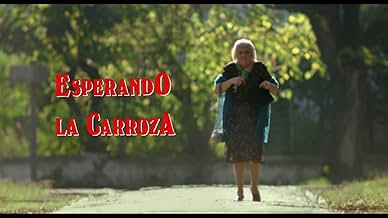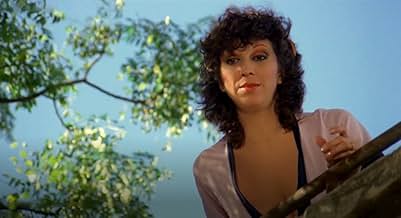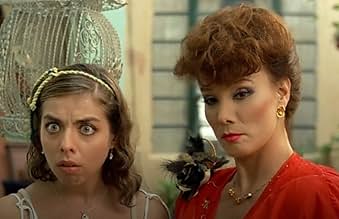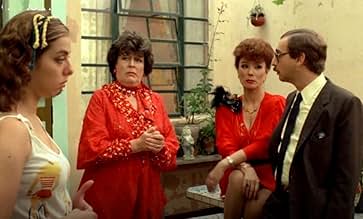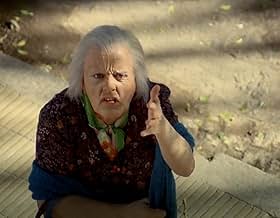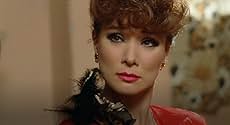Cada miembro de esta familia intenta respaldar a otra persona para que cuide a la madre anciana.Cada miembro de esta familia intenta respaldar a otra persona para que cuide a la madre anciana.Cada miembro de esta familia intenta respaldar a otra persona para que cuide a la madre anciana.
- Dirección
- Guionistas
- Elenco
Opiniones destacadas
To watch this film is to open your mind to an extreme point of laugh. Excellent performances and a beautiful art direction, this film becomes in Argentina's greatest comedy ever.
This film, boisterously noisy and overcharged with frantic bursting vitality, shows us a slice of Mediterranean life in a Buenos Aires (Argentina) humble working class neighborhood (Buenos Aires includes 49 neighborhoods and 11 million inhabitants, including the surrounding jurisdictions). Only half a dozen of them could be considered middle class, another four or five high class; the rest the working, poorer class.
From the beginning the tottering figure of Mamá Cora (Antonio Gasella in drag and full make up as an old lady), dizzily walking alone towards the camera in a long shot, accompanied by Feliciano Brunelli's accordion yodeling a sort of polka music from the 50s (he was extremely popular with the masses at that time), sets the mood for what is coming (And what is coming is consistently and relentlessly amusing and in crescendo to the very end of the movie, here again, the very cheerful Feliciano Brunelli's accordion closes the last credits, and you feel like having eaten a great dish of tasty ravioli with sauce and grated Provolone cheese in abundance).
A crazily-quilted interaction of dislocated characters mouthing lively dialogue (Gross..., oh, SO gross... both characters and dialogue) and having a ball. They talk and talk at dizzying speed (I doubt very much that the translation can really catch up with the double entendre of half of the overlapping dialogue, for most of the time ALL of them are screaming at the top of their voices and simultaneously).
All actors grasp the screwball comedy style of this director (Alejandro Doria) beautifully. Subtlety is not even remotely connected with this outrageous comedy.
Mónica Villa (Susana) is outstandingly good as the long-suffering housewife always on the verge of an earth shaking nervous breakdown, looking like a wet mouse. One wonders if the actress didn't really break down! So authentic is her performance full of passion and vital detail (Bette Davies would have killed for this role).
Her mother in law, Mamá Cora (Antonio Gasella in drag) is driving her nuts with her full-fledge Alzheimer. Gasella does an excellent interpretation of this dizzy old lady loosing all her bearings, but I don't get it: Why was he chosen to play this role when towards the end appears a real old lady (A friend of Mamá Cora that comes to the house) that could have been THE perfect Mamá Cora (I think that Gasella must have been a popular comic at the time and maybe he made that character popular, I guess).
Betiana Blum (Nora), excellent (In very broad and obvious acting terms) as the flashy nouveau-riche wife of one of the three brothers in the story and the only pretty female in the cast.
China Zorrilla (a very well known and loved actress in Argentina, that even now, 22 years later is still going strong and is very convincing within the limits of her overheated and theatrical school of acting.
Darío Grandinetti: I failed to notice him in this old movie, maybe because he was too young then.
All performances are uniformly good. The director conventional but very efficient, since with his ear for tempo keeps everything firmly under control and makes it fun to watch, although it is blatant and flashy in a very heavy-handed way.
Only to be seen when you long for a Marx Brothers film but don't have one handy.
From the beginning the tottering figure of Mamá Cora (Antonio Gasella in drag and full make up as an old lady), dizzily walking alone towards the camera in a long shot, accompanied by Feliciano Brunelli's accordion yodeling a sort of polka music from the 50s (he was extremely popular with the masses at that time), sets the mood for what is coming (And what is coming is consistently and relentlessly amusing and in crescendo to the very end of the movie, here again, the very cheerful Feliciano Brunelli's accordion closes the last credits, and you feel like having eaten a great dish of tasty ravioli with sauce and grated Provolone cheese in abundance).
A crazily-quilted interaction of dislocated characters mouthing lively dialogue (Gross..., oh, SO gross... both characters and dialogue) and having a ball. They talk and talk at dizzying speed (I doubt very much that the translation can really catch up with the double entendre of half of the overlapping dialogue, for most of the time ALL of them are screaming at the top of their voices and simultaneously).
All actors grasp the screwball comedy style of this director (Alejandro Doria) beautifully. Subtlety is not even remotely connected with this outrageous comedy.
Mónica Villa (Susana) is outstandingly good as the long-suffering housewife always on the verge of an earth shaking nervous breakdown, looking like a wet mouse. One wonders if the actress didn't really break down! So authentic is her performance full of passion and vital detail (Bette Davies would have killed for this role).
Her mother in law, Mamá Cora (Antonio Gasella in drag) is driving her nuts with her full-fledge Alzheimer. Gasella does an excellent interpretation of this dizzy old lady loosing all her bearings, but I don't get it: Why was he chosen to play this role when towards the end appears a real old lady (A friend of Mamá Cora that comes to the house) that could have been THE perfect Mamá Cora (I think that Gasella must have been a popular comic at the time and maybe he made that character popular, I guess).
Betiana Blum (Nora), excellent (In very broad and obvious acting terms) as the flashy nouveau-riche wife of one of the three brothers in the story and the only pretty female in the cast.
China Zorrilla (a very well known and loved actress in Argentina, that even now, 22 years later is still going strong and is very convincing within the limits of her overheated and theatrical school of acting.
Darío Grandinetti: I failed to notice him in this old movie, maybe because he was too young then.
All performances are uniformly good. The director conventional but very efficient, since with his ear for tempo keeps everything firmly under control and makes it fun to watch, although it is blatant and flashy in a very heavy-handed way.
Only to be seen when you long for a Marx Brothers film but don't have one handy.
10vngf
This movie is an Argentinean masterpiece. There is not a single moment when I don't find myself laughing. Every single actor, including the ones in supporting roles, are beyond excellent. The movie was just re-released for its twentieth anniversary and it is a must for any collector of comedy. This is comedy at its best. The character of Mama Cora, played by Antonio Gasalla is the most convincing portrayal of an elderly woman I have ever seen. His mannerisms, gait, etc. are superb. Although this story portrays an Argentinean family dealing with the dilemma of taking care of an elderly mother, this is a story that could happen to any family in any place in the world. Enrique Pinti has a minor role as Felipe, the family drunk, that is beyond belief. I highly recommend this great film.
Or en espanol, Esperando la Corrazzo. Mama Cora has been living with Jorge and Susana for four years now, and is starting to go senile. She's doing crazy things that drive Susana crazy. The couple needs a break from mama, and they talk to the other siblings about taking her for a while. So much arguing, cussing, accusing, yelling, bringing up old conflicts, affairs... Meanwhile.... there's a report of an old lady found dead across town, so of course they rush over to see if it's really her. Mistakes are made, more arguing. Some really funny stuff in here. a farce. Lot's of surprises in this one! found this one on netflix while I was looking for something else. Great stuff! Original Play by Jacobo Langsner. Directed by Alejandro Doria. this one seems like an Almodovar film. family conflicts, arguing, secrets coming out. although the conversations are all faster and louder.
I watch a lot of movies, but this one is exceptional. First of all, it's a comedy, and a hilarious one; it's dark and twisted and each character is perfectly and utterly designedm from the leadings to the supporting roles. It also has great performances, the cast is something like an Altman or Woody Allen movie in which you can find the most famous actors doing a small but superb appearance. It reveals all the human misery in its neuroses, the egotistic, the addicted, the superficial, the martyr, the stupid, the fascist, etc. But it does so in an incredibly funny (plainly funny) and sarcastic way.
Major!
Major!
¿Sabías que…?
- TriviaAll the houses that appear in the film are very close to each other in the same Buenos Aires neighborhood, Versalles. The main house (Elvira and Sergio's) became too old with the years. It was about to face demolition but the city's government decided to mark it as a cultural landmark and it was totally repaired. Now, it is a site of pilgrimage for thousands of fans who visit it all year round to take pictures and tour around the neighborhood. The house is inhabited by the same family who owned it at the time of the filming. They even have a female dog as pet named after one of the characters in the movie: "Matilde" (the young daughter of Elvira and Sergio).
- Citas
Antonio: [in the car, eating an empanada he picked up from some very poor relative's house] What misery! What misery! Do you know what did they have for lunch?
Sergio: [looking at the empanada Antonio is eating] Empanadas.
Antonio: Three of them. It broke my heart! Three leftover empanadas from last night's dinner for two people! God, how little you can do to help people!
- ConexionesFeatured in AM - Antes del mediodía: Episode dated 24 October 2012 (2012)
- Bandas sonorasBarrilito de Cerveza
("Skoda lásky")
Written by Jaromir Vejvoda with Wladimir A. Timm and Lew Brown
Performed by Feliciano Brunelli y orquesta
Selecciones populares
Inicia sesión para calificar y agrega a la lista de videos para obtener recomendaciones personalizadas
- How long is Waiting for the Hearse?Con tecnología de Alexa
Detalles
- Fecha de lanzamiento
- País de origen
- Idioma
- También se conoce como
- Waiting for the Hearse
- Locaciones de filmación
- Versalles, Buenos Aires, Distrito Federal, Argentina(Plaza Ciudad de Banff)
- Productoras
- Ver más créditos de la compañía en IMDbPro
Taquilla
- Total a nivel mundial
- USD 596,550
Contribuir a esta página
Sugiere una edición o agrega el contenido que falta

